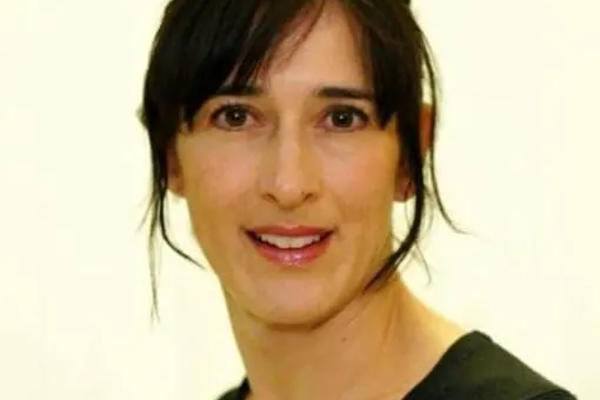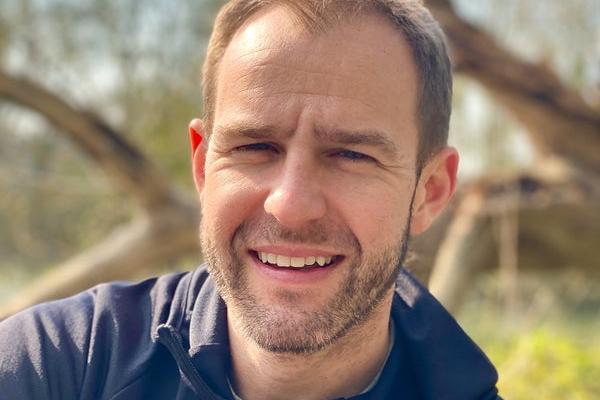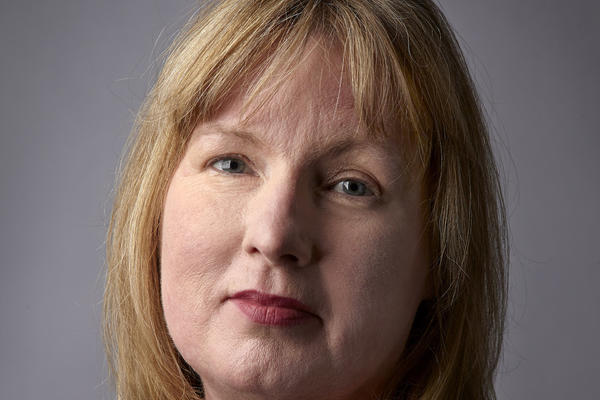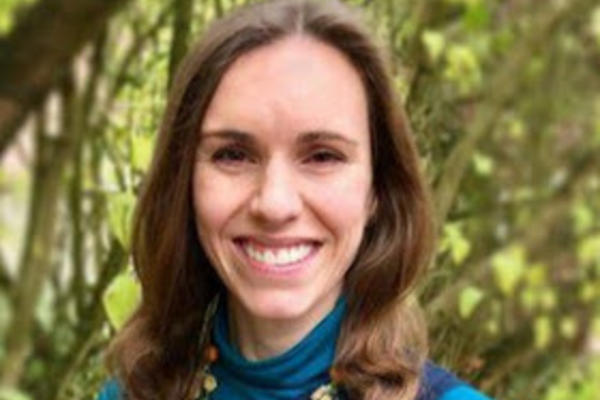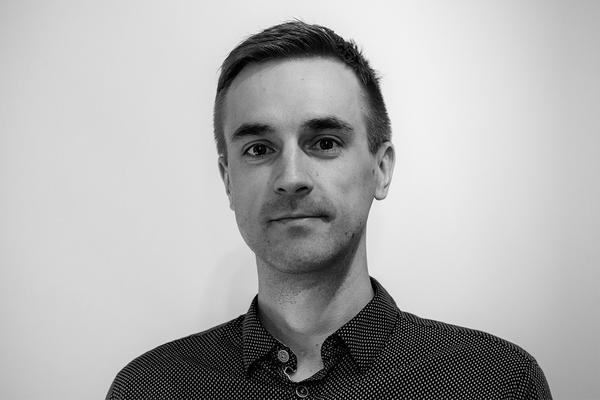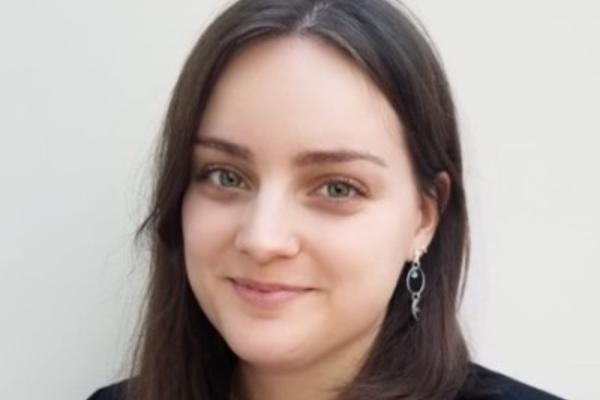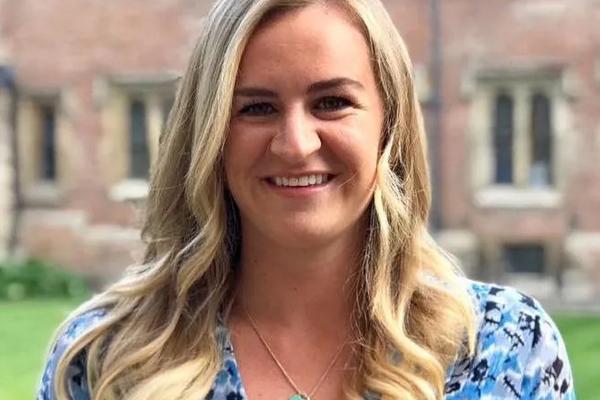The Online Active Community Engagement (O-ACE) project
About the O-ACE project
Mental health and wellbeing are among the major public health concerns of the COVID-19 pandemic, and increasing pressure on healthcare services demands sustainable alternatives to clinical methods of targeting mental health. These alternatives can include museums and cultural community assets (libraries, gardens, heritage sites), though strong empirical evidence of how such assets benefit mental health has been lacking. The extraordinary period of 2020-21 witnessed government-enforced ‘lockdowns’, the closure of museums and galleries all around the world, and the rapid pivot to online consumption across all industries. These circumstances afforded a unique opportunity for researchers at Oxford to investigate the impact and effectiveness specifically of online cultural resources for mental health and wellbeing.
This project harnesses world leading expertise in psychiatry, internet research and cultural organisations, with an interdisciplinary research team led by the University’s Department of Psychiatry, the Oxford Internet Institute and the Gardens, Libraries and Museums division. The material used in the development and testing phase of the project draws heavily on the internationally important collections of the Ashmolean Museum.
O-ACE Project funders
- COVID-19 Research Response Fund
- Westminster Foundation
-
Huo Family Foundation
O-ACE Project dates
June 2020-March 2022
O-ACE Research aims
This project set out to advance collective knowledge around the use, benefits, and optimisation of online cultural content for mental health. The specific objectives were:
- To conduct a rapid, systematic literature review of community assets for mental health and wellbeing;
- To evaluate the type, benefits and audiences of online cultural content on offer;
- To engage research participants throughout the project, with a particular focus on those vulnerable to mental health problems during the pandemic;
- To develop and test content using experimental medicine methodologies and measure impacts on mental health and wellbeing;
- To generate pilot data that can be used for longer-term enquiry and development.
O-ACE Research methods
The project was grounded in rigorous qualitative and quantitative methodologies enacted over several phases, each informing the next. As this project was conducted during the COVID-19 pandemic all research was remote. For example, surveys were distributed and completed online, and focus groups took place via video-conferencing software. The findings from Phase 1 shaped the focus for phase 2, namely to create a testable online intervention with and for young people aged 16-24.
| Description | Reach | ||
|---|---|---|---|
| Phase 1 |
Systematic literature review of community based interventions for mental health and wellbeing |
13,000 studies | |
| Global case studies of online cultural content | 10 studies | ||
| Online baseline survey to gain an understanding of the use of online culture and potential mental health benefits, socio-demographic characteristics and self-reported health status. | 1056 people | ||
| Follow-on free-text survey to help identify how online arts and culture are used for mental health and wellbeing. | 176 people | ||
| 1-2-1 qualitative interviews with young people aged 16-24. | 13 people | ||
| Consultation with people with lived experience to advise on potential usefulness of arts and culture for mental health and direction of research | 3 people | ||
| Phase 2 | Workshops with young adults to co-produce an online cultural intervention | 12 young people | |
| Experiment (randomised control trial) to test and measure the intervention against a standard museum website experience. | 463 young people |
O-ACE Activities and Findings
This short video summarises the approaches to the research and the co-production process behind the creation of the online cultural intervention, 'Ways of Being'.
O-ACE project - optimising online cultural content for mental health
The literature review aimed to describe studies of community interventions delivered to adults and/or young people, either in person or online, evaluated in randomised controlled trials and provide an indication as to their effectiveness, acceptability, quality of data and where possible, mechanisms of action. We included interventions delivered at and/or by museums, art galleries, libraries, gardens, music groups/choirs and sports clubs. The study only fond 31 eligible examples concluding that, while community engagement is a promising area for wide-reaching interventions to be implemented and evaluated, more high-quality trials are needed.
The summary of the cultural heritage sector response to the pandemic and its significance for health and wellbeing looked at the ways organisations sought to bring content online, either through repurposing existing digital assets, digitising events or exhibitions or piloting something new. The studies, from Europe, the US, and New Zealand showed an enthusiasm for the need to address mental health and wellbeing but a lack of empirical evidence to ascertain how and if something is effective. The initiatives were overwhelmingly aimed at existing users rather than new or underserved audiences.
The in-depth surveys and interviews with young people aged 18-24 (who were socio-demographically diverse, had a range of mental health experiences, and varied in their use of online arts and culture) allowed us to map out helped us map out how online cultural content could be helpful. Six themes emerged:
| Human connection | Characteristics of other activities | Online engagement |
| Mechanisms of impact | Mental health outcomes | Engagement optimisation |
- Participants said online engagement had some advantages over in-person engagement and benefits were greater with familiarity and regular use
- Having a 'human connection' was identified as the feature of online arts and culture that was most likely to benefit mental health
- Participants emphasised the importance of representation
- The mechanisms by which online arts and culture could help mental health included improving perspective, reflection, learning, escapism, creativity, exploration and discovery, which might help disrupt negative thought patterns, lift mood and encourage feelings of calm and proactivity.
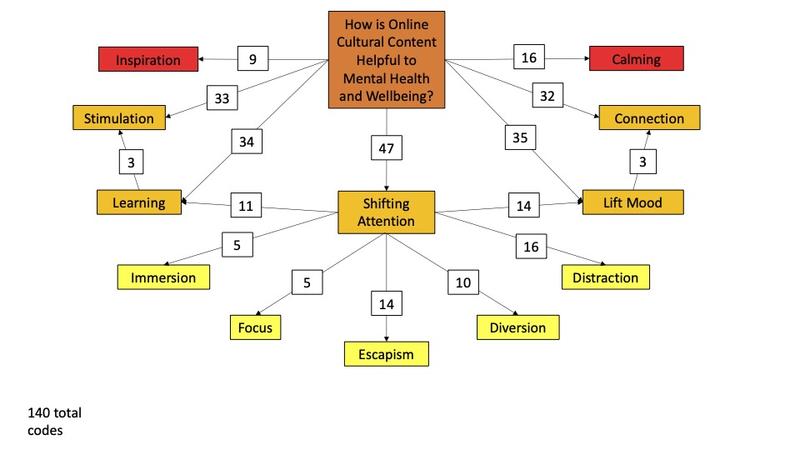
Connections map showing the components and weighting participants gave to the ways online cultural content could be helpful for their mental health and wellbeing
Over four months we worked intensively with the target group to identify collections, stories and do new historical research that would underpin content that aimed to activate some of those mechanisms. The co-producers were highly active in thinking through the ways stories should be presented and the importance of representation:
"The overall production process was a great experience, with lockdown having its impact on a range of people, speaking to and hearing from those who are in a similar situation made it easier to talk about personal experiences and how art had its part to play. We would spend time discussing the impact of either the art pieces themselves and what they evoked or the artists’ and their lives, this created a sense of relatability, a reflection of sorts. The production also allowed for our backgrounds to be a crucial aspect, having the opportunity to show sensitivity to certain people (whether it be their gender, ethnicity, sexuality or disability) led to us creating a more inclusive resource." Co-producer, SB
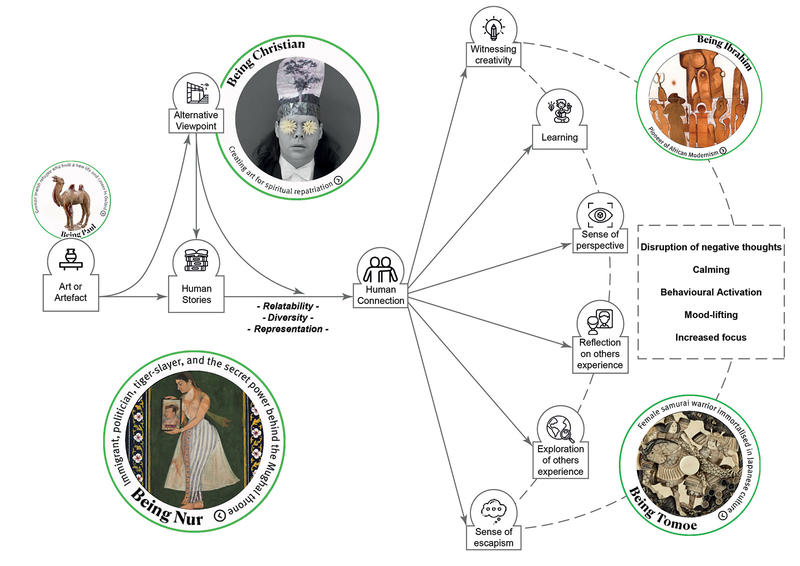
Conceptual framework of the mental health benefits of online arts and culture for young people
The development sprints were led by interactive experience experts Imagineear to co-design the intervention. Ways of Being was a web experience that required users to login (to capture their dwell time and activity) and featured highly visual navigation and content with image, text and audio, and options for users to leave their own comments and perspectives The video below provides a walkthrough experience of using Ways of Being, demonstrating the content but also the specific features which respond to requirements outlined in the research and which differentiate it from many 'standard' museum websites
Once ready, we recruited more than 400 young people from a range of backgrounds to take part in a randomised control trial. Many were from groups that were unlikely to access online culture, or access clinical services for mental health support. Participants were randomly assigned to either the intervention or a generic museum website experience and were asked to access their resource over the period of a few days whilst taking measures before, during and after exposure for mood, distress, anxiety, learning, flourishing and loneliness, as well as providing qualitative responses afterwards.
The results showed that those in the intervention group experienced less negative emotion (NA in the diagram below), particularly during the intervention period. Sub-group analyses indicated that the effect was marked in non-white and male participants.
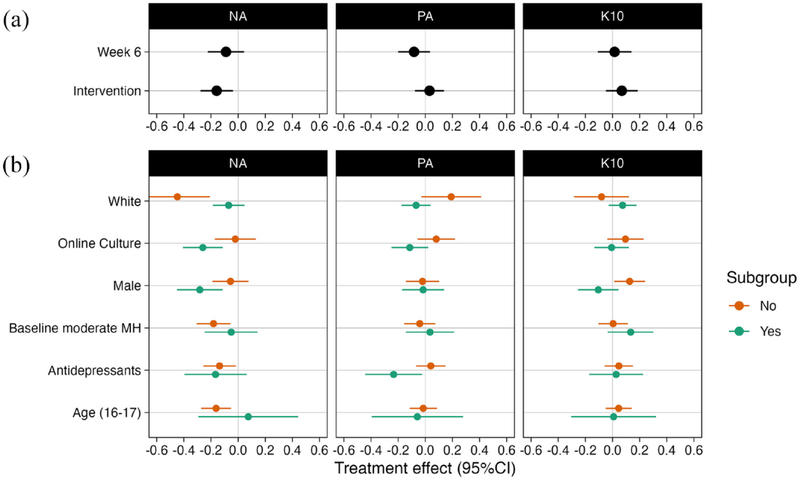
Subgroups analysis for mood and mental distress. (a) shows average differences across both groups (Ashmolean and Ways of Being) during intervention and at week 6 follow-up for negative (left) and positive affect (middle), and K10 (right). (b) Group differences as (a) for different subgroups, but during intervention only.
O-ACE Outputs
The findings of the project formed the basis for a follow-up NIHR major programme grant for further research. The ORIGIN (Optimising cultural expeRIences for mental health in underrepresented younG people onlINe) project (2023-2028) can be found here: https://www.glam.ox.ac.uk/origin
Publications
-
Syed Sheriff, Bergin L, Bonsaver L, et al. Online arts and culture for mental health in young people: a qualitative interview study. BMJ Open 2023;13:e071387. doi: 10.1136/bmjopen-2022-071387
-
Buechner H, Toparlak SM, Ostinelli EG, et al. Community interventions for anxiety and depression in adults and young people: A systematic review. Australian & New Zealand Journal of Psychiatry. 2023;0(0). doi:10.1177/00048674221150362
- Syed Sheriff RJ, Vuorre M, Riga E, et al. A co-produced online cultural experience compared to a typical museum website for mental health in people aged 16–24: A proof-of-principle randomised controlled trial. Australian & New Zealand Journal of Psychiatry. 2022;0(0). doi:10.1177/00048674221115648
- Syed Sheriff, R., Adams, H., Riga, E., Przybylski, A., Bonsaver, L., Bergin, L., . . . Geddes, J. (2021). Use of online cultural content for mental health and well-being during COVID-19 restrictions: Cross-sectional survey. BJPsych Bulletin, 1-10. doi:10.1192/bjb.2021.103 https://www.doi.org/10.1192/bjb.2021.103
- [PREPRINT] Syed Sheriff, Rebecca and Vuorre, Matti and Riga, Evgenia and Przybylski, Andrew and Adams, Helen and Harmer, Catherine J. and Geddes, John, An Online Cultural Experience for Mental Health in People Aged 16-24 Compared to a Typical Museum Website: A Randomised Controlled Trial. Available at SSRN: https://ssrn.com/abstract=3934229 or http://dx.doi.org/10.2139/ssrn.3934229
- Adams, Helen, Sheriff, Rebecca and Cooper-Hammond, Clare. "Optimising online cultural content to positively impact mental health in young people." MW21: MW 2021. Published January 30, 2021. Access this item
- Adams, Helen, and Bonsaver, Laura. "Characterising the online cultural heritage response culture under lockdown and its significance for health and wellbeing". Medium. Published 25 May 2022. Access this item.
Presentations
MuseWeb 2021 (MW21) conference, January 2021
Kids in Museums conference, 'The future of youth and family engagement in museums', May 2021
Centre for the Creative Brain - University of Oxford, Cultural Experiences and Mental Health seminar programme, May 2021
British Library conference, 'Open and Engaged', November 2021
University Museum Group AGM, November 2021
NIHR Oxford and Oxford BRC Open Day, ' Can online cultural experiences help your mental health?', July 2022
MuseumNext: Museums, Health and Wellbeing Summit, 'You can't schedule mental health, February 2023. Access this item




